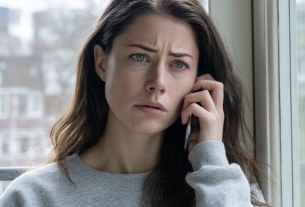My name is Svetlana, but everyone just calls me Sveta. I am twenty-six years old. And even now, despite the years, I cannot forgive my mother. Not because she was cruel or indifferent—quite the opposite. She did what she believed was right, protecting me and our family. But it was her choice that left a deep wound inside me that doesn’t heal. This resentment has lived inside me for more than two decades now, like a splinter that can’t be pulled out. Sometimes I think: if I could turn back time, I would ask her to think again before taking me away from the home where it was warm, cozy, and where my old life was.
I was born in a big, noisy city where it seemed everything was possible. In my memories, we were a normal family, like everyone else’s. My father worked in logistics, then moved to an international company—the salary became decent. We had a three-room apartment in a good neighborhood, a foreign car, trips to Turkey, an expensive kindergarten with a pool and English lessons. Mom didn’t work officially—she took care of the house and me, and sometimes took sewing orders for curtains or tablecloths. The house smelled of baked goods, the fridge was always full, and every evening my father brought me a Kinder Surprise. It seemed all children lived like this. Later I realized it was not so.
Over time, my father began to travel for work more often. At first, for a couple of days, then for weeks. He always returned with gifts, happy, tired but kind. I loved greeting him—he smelled of strange cities, roads, coffee, and new stories. But gradually the house grew quieter. Mom talked less and thought more. They increasingly shut themselves in the bedroom, and I heard them arguing. Loud words, accusations, sobbing. I didn’t understand what they were fighting about, but I felt something was wrong. I was about six then. At that age, you don’t know what betrayal, infidelity, or exhaustion in relationships are. You only feel the familiar harmony disappearing.
And then one night, something happened that changed everything.
I woke up to a loud scream. Mom was crying. Father was sharply answering her. Then— a slap. A sharp, snapping sound like someone flicking a belt on skin. After that—silence. So thick that even breathing stopped. Then came a sob, footsteps, the rustle of clothes. I lay in bed holding my breath, not knowing what to do. I didn’t understand what had happened, but I felt fear fill the room.
The next morning, Mom packed a suitcase. Quickly, almost without words. She threw my things into a backpack. When I asked where we were going, she replied shortly: “To grandmother’s.” Nothing more. I thought it was temporary. That we would come back soon. But we never did.
The move felt like an escape. No explanations, no goodbyes. Mom sold some things, took care of some documents, and we boarded a train. We traveled a long time, across the city, fields, and forests until we reached a distant corner of Russia—Vologda. The city was unfamiliar to me, cold even in summer, with narrow streets and old wooden houses that smelled of dampness, cabbage, and abandonment.
Grandmother’s house was the same—old, dim, with a rotten porch and rugs that should have been thrown out long ago. Grandmother met us strictly, dryly, with a look full of constant wariness. It seemed she expected trouble every minute. I hoped it wouldn’t be long. That Dad would come for us. That they would reconcile. That we would be together again.
He did come a week later. Without warning, suddenly. He held a bag with gifts rustling in the paper. His voice sounded cautious, full of hope and fear at once:
“Let’s go home,” he said to Mom.
But she didn’t answer. Her face was stone. Only her fingers gripped my shoulder so tightly I flinched from the pain.
“You hit me,” she said, each word like a knife.
Dad fidgeted, his eyes darting.
“It was just once… in a fit of anger… I apologized!”
But Mom didn’t even look at him. In her eyes was something more than hurt—there was a final decision made long before this meeting.
After that, he tried to contact us for several more months. Came with flowers, sent messages, called. But one day he disappeared. Forever.
Only a year later did I find out they had filed for divorce. That Mom arranged for child support. That she completely cut ties with the man she once loved.
The school in Vologda wasn’t the best. Swearing became a second language long before we learned to solve math problems. By third grade, kids knew curse words better than the alphabet, and by fifth, they held whole contests of rhymes during recess. Our math teacher always came in the same worn jacket, smelling of cheap brandy with trembling hands. She wrote on the board leaving clouds of vapor, and we pretended not to notice how addition problems turned into scribbles.
But even here, among the grayness and noise, there were small islands of light—a worn volume of Pushkin in the school library, an old pianist patiently teaching us “Für Elise” on a detuned piano, and a girl from a parallel class who always shared her sandwich with me.
I never got used to these streets, these houses, this feeling that we lived someone else’s life. Mom got a job as a salesperson in a furniture store. We weren’t hungry, but it was a completely different reality—no gifts, no trips, no Dad’s laughter or the smell of his favorite lotion.
At first, I asked: “Where is he? Why aren’t we together? Why haven’t you forgiven him?”
And Mom always gave the same answer:
“He raised his hand against me. And that says it all.”
I was silent. Didn’t argue. But the question spun in my head: is one slap really a reason to destroy the whole family? He didn’t hit her every day. Didn’t abuse or humiliate her constantly. He just lost control once. Maybe we could have tried to start over? For my sake?
When I grew up, I started looking for Dad on the internet. I found him. He lived in a city, married another woman, and they had a daughter. In the photos, he was smiling, holding a child, walking in a park, taking them to cafes, going out of town on weekends. I looked at those pictures and felt my heart tighten. Maybe he hadn’t forgotten me?
One day, I gathered courage and wrote him:
“Hi, Dad. It’s Sveta.”
He replied quickly:
“How are you? I think about you often.”
I didn’t know what to say. He suggested meeting. We met once—in a café near the train station. He brought me earrings and a chocolate bar. He said he missed me. I nodded, listened, but inside was empty. How do you talk to someone who was part of your childhood but now seems a stranger?
Mom knew nothing about this meeting. I didn’t tell her. What could I say? That I see a man she considers a traitor? That I still wait for him to come and say: “I will bring you home”?
Sometimes I feel like I grew up with a hole inside. Not because Dad abandoned us—he didn’t abandon us. But because Mom didn’t give us a chance. Neither to herself, nor to me, nor to all of us together. She chose protection, but didn’t try to save. Didn’t give time, didn’t ask me—a child who also had the right to an opinion. Dad was guilty. Yes, he lost his temper. He did something unforgivable. But is everything in life really black and white? People make mistakes. Sometimes they want to fix things. Love doesn’t have to be perfect, but if there is at least an attempt—shouldn’t you cling to it?
I grew up too soon. Learned not to dream, not to hope, to live within limits. I went to college, then got an office job. Recently, I visited the city for work. I found our old home, stood by the entrance, looked at the windows. I remembered: a warm morning, the smell of coffee, Mom in a robe, Dad getting ready for work, and me—small, happy.
How good it was then…
If only I could go back to that moment. If only I could scream: “Don’t leave! Talk!”
But six years old is not an age to be a judge. Mom chose protection. Dad—freedom. And I was left somewhere in between. Between childhood memories and grown-up resentments.
And I still don’t know if I have forgiven her. Probably not.



